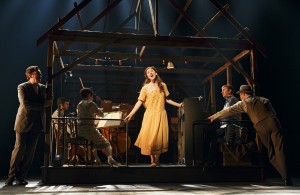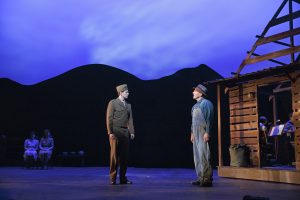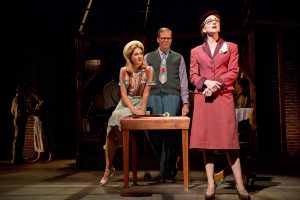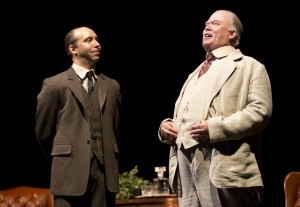“Bright Star”: Globe’s Reward For the Faithful
Bright Star, a new musical now in its world premiere at the Old Globe Theatre, is a very special show, one to be cherished and recalled from now on, the sort of reward that avid theatregoers dream of.
Steve Martin, who just seems never to strike out no matter what he’s doing, and Edie Brickell, an apparently bottomless songmaker from the south, found the story somewhere in Appalachia and nursed it into a robust fable that will enchant audiences and energize colleagues throughout the profession.
Martin and Brickell are fearless creators, not intimidated by sentimentality, cliché, coincidence, time’s healing or happy endings. Most impressive of all is their faith in the power of their songs, which they deploy boldly at the very peak of the script’s most dramatic moments.
Thus a character, smacked in the face by a life-changing revelation, is less likely to stagger and goggle and more apt to release swelling emotions in a new song, an approach exploited by the most powerful music theatre of all, grand opera.
But without the formality. This sweet, flavorful yarn, with its piquant literary overlay, resembles more a fairy tale, instantly accessible but likely to stick in memory.
And the unforgettable first act finale can only end with blackout and silence. Followed by very subdued intermission chatter.
There are two eras that come and go: Rural North Carolina in the immediate aftermath of World War II and the same neighborhood a couple of decades earlier. A likeable boy and a tender girl play out their romances in each time; the ultimate shared impact is the spine of the play. The 1945-46 scenes have the sharper reality. The 1920s are more dreams and nightmares. But the story pivots effortlessly as needed, driven always by the bluegrass accompaniment and the virtuoso staging.
Director Walter Bobbie achieves wonders with an inventory of furniture and props, an assortment of site-specific wagons and a half-dozen actors augmenting the principals. His montages skip through time and place as blithely as his tight dramatic scenes snap into quivering urgency.
There are ensemble numbers with the buoyancy of hoedowns but they never quite slip into standard stage hoopla – well, hardly ever – under the discipline of choreographer Josh Rhodes.
Some scenes – a summer dance by the lake, a visit to a grave – are ravishing in their atmospheric nostalgia but Eugene Lee’s set also allows for bright bubbles of realism: A radio station, a wealthy man’s study, a dear little bookshop. About the only thing that doesn’t really work is a train passenger car. (Sorry, but The Music Man got there first.)
Lee’s master scenic stroke is not the portable cabin, which holds six of the 10 musicians and several major scenes as it’s wheeled bout, but instead the up and down of the upstage drop curtains cut to suggest the silhouette of a mountain range, superbly enhanced by Japhy Weideman’s velvet lighting design.
The show plays over a bluegrass pulse that never seems far away. The actors sing accordingly but without forcing the genre. In fact, there are surprisingly rich and unexpected colors in the score – Aaron Copland? Virgil Thomson? – quite unexpected from the banjo/fiddle/mandolin sound. That appears to be the work of orchestrator August Eriksmoen, working with offstage strings, and arranger/musical director Rob Berman, who also conducted from the keyboard of piano and accordion.
In the central role of the lady editor who plans to start a new Southern literary renaissance, Carmen Cusack is hard-edged and demanding until she melts into the restless girl of 22 years earlier. Aided (as is everybody else in the show) by Jane Greenwood’s accurate but comfortable costumes, Cusack swings back and forth easily, her voice adjusting as smoothly as her emotions.
Wayne Alan Wilcox plays her beau of the 20s and A. J. Shively is the returning soldier 22 years later, a would-be writer she decides to mentor. Both are immensely appealing, strong and sure of voice and able to show manly but sensitive reaction to big emotional moments, exactly the element that so sets this play apart in an age of bombast and irony.
Wayne Duvall, as a dynasty-minded big-shot, is equally in control of a role which frankly invites Lillian Hellman/Tennessee Williams excess. Understanding the mechanics of impulse, he reaps a rich reward in vivid decline. Steven Bogardus and Stephen Lee Anderson are equally controlled and effective as senior males and a bevy of actresses handle the distaff side more discreetly.
The highlight of Libby Winters’ role as the editor’s ditzy sister is “Another Round,” a rousing song of self-loathing debauchery, handled with enthusiasm. Hannah Elless runs that bookstore fetchingly and Kate Loprest joins Jeff Hiller as a pair of genteel wiseacres working for the editor.
Hiller’s character is understood today as gay, just as he would have been back in the day, only without the acknowledgement. That rings exactly true to an ear long removed from but still linked to the South. There’s a lot of that in this script, probably the influence of Brickell. And there is some truly off-the-wall stuff – girl asks boy what it was like, kissing her rival. BOY: “Have you ever kissed a chicken?” GIRL: (embarrassed, giggling) “Yes!” – that sounds like pure Steve Martin.
There are some suggestions I might make. The song about the baby being taken away needs to be replaced. I’m still wondering about whatever happened to the mayor and the sister.
But actually, this is one of those shows that you really don’t want to mess with.
A very, VERY special show.
Continues at 7 p.m. Tuesdays, Wednesdays and Sundays; at 8 p.m. Thursdays-Saturdays; and at 2 p.m. Saturdays and Sundays through Nov. 2, 2014.

Welton Jones has been following entertainment and the arts around for years, writing about them. Thirty-five of those years were spent at the UNION-TRIBUNE, the last decade was with SANDIEGO.COM.






